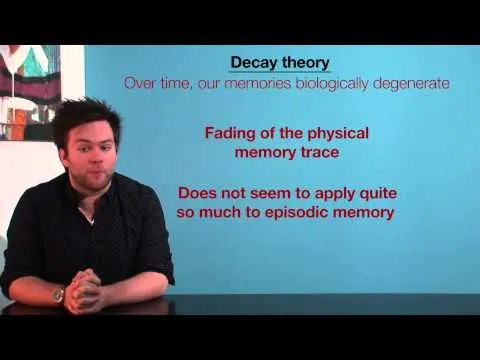Okay, family, we are now going to look at another cool subtopic in our ongoing blog-isode series.
How can we talk about exploring our memory without looking into the subject of forgetting?
Let's Get to it:

In popular usage, the word forgetting is employed as a blanket term whenever memory fails.
But as we have seen in previous blog-isodes, memorial failures have many causes. Some arise from faulty storage procedures, while others are produced by conditions at the moment of recall.
Now, let's consider how these failures relate to the time between when we first learn something and when we test our memory. It seems that forgetting generally becomes more common as this time interval gets longer.
Obviously right?
Yesterday's lesson is fresher today than it will be tomorrow.
Hermann Ebbinghaus, a German scientist knew about this fact.
He started studying how people learn by making lists of made-up syllables like "zup" and "rif" and trying to memorize them in order. He used himself as the person to study.
He was the first person to create a forgetting curve. He did this by testing himself at different times after learning, using different lists each time. Then, he measured how hard he had to work to relearn the list to the same level he had reached before.
He found that there was a "saving": Relearning the list took fewer trials than did the original learning.
As one might expect, the saving declined as the retention interval increased. The decline was sharpest immediately after learning and became more gradual thereafter.
Now let's consider this obvious question:
Why do long-term memories tend to weaken as time passes after learning?
There are several theories designed to explain this and related phenomena. We will look into a couple in today's blog-isode.
The oldest theory of forgetting suggests that memory "decays" (fade away) over time, similar to how mountains wear away from wind and water erosion.
The erosion of memories is presumably caused by normal metabolic processes whose impact wears down the memory trace until it fades and finally disintegrates.
Interesting right?
However, although this theory seems reasonable, there isn't much direct evidence supporting it yet.
One study tried to provide an indirect test by varying body temperature.
Just like many chemical reactions speed up when it's warmer, metabolic processes also increase with higher temperatures. If these processes are what cause memory to fade, then forgetting might be linked to body temperature during the time we try to remember things.
This idea has been tested with animals like the goldfish, which have body temperatures that match their surroundings because they're cold-blooded.
Overall, the findings have supported the idea(hypothesis): the higher the temperature of the tank in which the fish is kept during the retention interval, the more forgetting takes place.
Fascinated Yet?
But some other findings complicate this picture.
There is strong evidence showing that forgetting isn't just about how long you try to remember something, but also about what goes on during that time.
Experiments on human subjects have shown that remembering is much worse after an interval spent awake than after an equal period while asleep.
Later research into this subject suggest that, the favorable effect of sleep on retention only holds for quiet, slow-wave sleep.
These findings make it hard to support a theory that says forgetting happens only because of decay over time, because they demonstrate that time alone isn't responsible for all memory loss.
To make sense of these findings using a theory of decay, one would need to suggest that the processes that weaken memory are slow down or are countered during one or all stages of sleep.
We will look more into this in our next blog-isode tomorrow.
Just a video bonus to explain this further👇
The Bus Stops Here for today:
Thank you, friends, for staying with me through these blogisodes. Your thoughts and opinions are always welcome and appreciated. I'd be happy to hear them. We will build on this in tomorrow's blogisode. Until then, stay safe, friends.

References and Links
https://www.verywellmind.com/explanations-for-forgetting-2795045
https://www.simplypsychology.org/forgetting.html
https://www.verywellmind.com/forgetting-about-psychology-2795034
https://encyclopedia.pub/entry/31983
https://unacademy.com/content/upsc/study-material/psychology/theories-of-forgetting/
